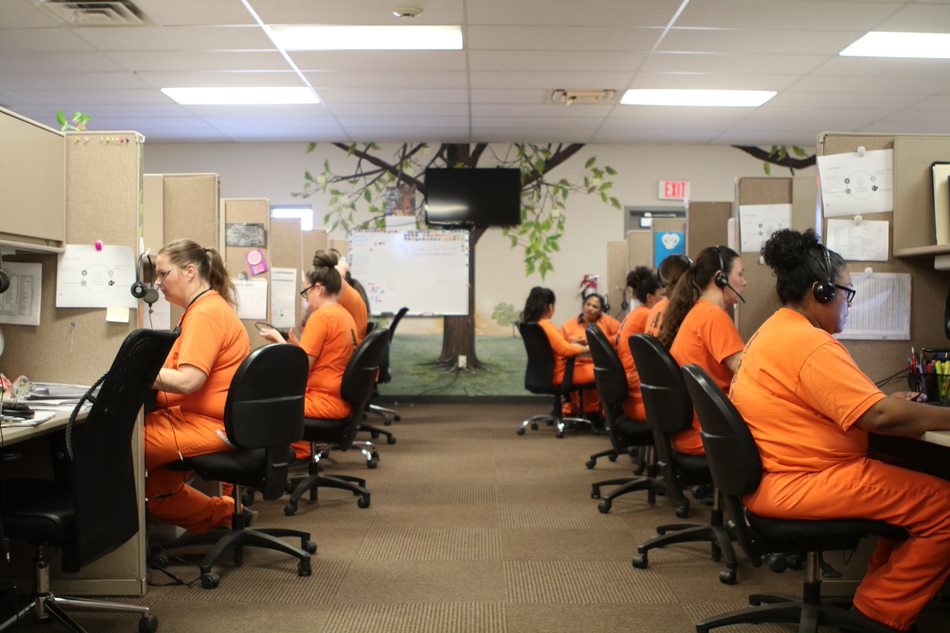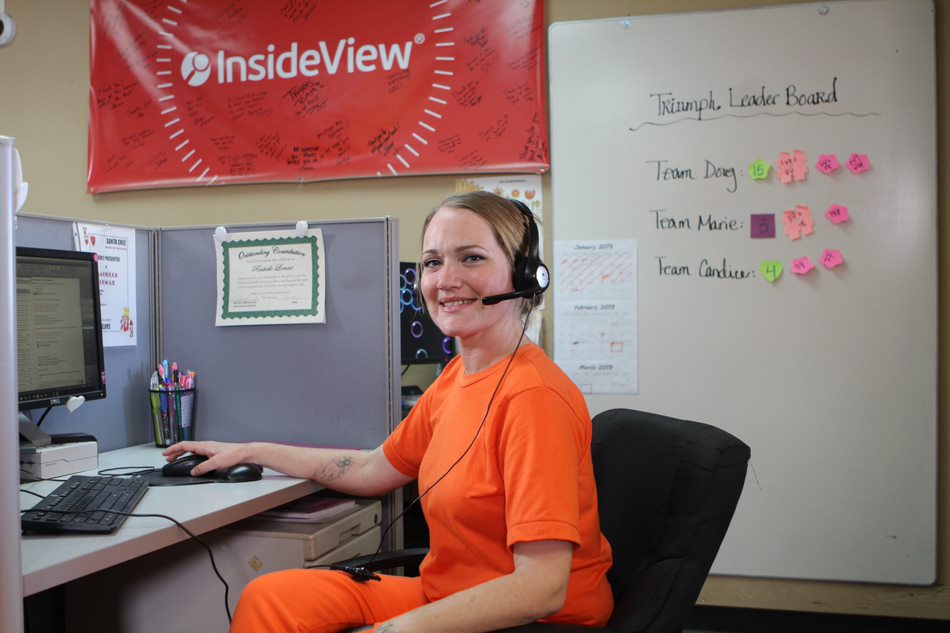This is an iceberg story. We’re only sharing a handful — a slice, really — of the truths held behind the walls of Perryville Correctional Facility. And this story doesn’t stop at the prison gate. This is, after all, a story of freedom. Freedom to support yourself with honest, gainful employment. Freedom to hold one’s head high, contribute to society, recreate a life for yourself and (often) for your family.
As conscious capitalists, we hope this article challenges you to look beyond stereotypes and discover how creating a prison-to-workforce plan can revolutionize your business, the bottom line, and countless lives. The ultimate win-win-win.
How many of us can look back on our lives and say, with complete honesty, that we haven’t made similar choices? How many of us say that from a place of privilege, from family systems that are functional, from communities that aren’t teeming with addiction? How many of us can live our lives unfettered by this branding because we simply didn’t get caught making that mistake? To be clear, if you’ve ever driven home from a company function after consuming two or more glasses of wine and haven’t been caught, you’re lucky.
Our society believes in taking a “time out,” spending a certain number of years away from others as a consequence for breaking the law. No one in Perryville disputes that they broke the law. They dispute the ongoing extraction of emotional, social, and financial restitution from them and their families, for the rest of their lives. We take from them human dignity. We mark their souls with indelible ink, branding them as unworthy of living a life. We punish people for mistakes they made on the worst day of their life, for the rest of their life.
Before we get ahead of ourselves, let’s introduce the players. Phoenix-based Televerde is the first and only fully integrated sales and marketing technology organization with a proven execution model for generating demand and accelerating sales. For the past 25 years, Televerde has operated a scalable marketing business, executing an account-based selling (ABS) model that results in a strategic, consistent experience across the sales cycle. Their agents are an extension of their clients’ sales and marketing teams. Essentially, Televerde builds relationships with targeted prospects to identify their unique wants and need, aligns them to customized solutions, and provides the information needed to move more quickly from prospect to customer.
Launched by Televerde in 2011, Arouet Foundation is a non-profit organization (also in Phoenix) that has designed a world-class three-year reentry program that assists women transitioning from incarceration and helps them meet their personal and professional reintegration goals. Their Workforce and Career Advancement Center specializes in workforce training, identifying Fair Chance employers and full-service career placement.
And then there’s Perryville: one of 13 prisons operated by the Arizona Department of Corrections. In 2000, it was converted to an all-female facility and currently houses a mixed security population of more than 4,300 women. This number has more than doubled since 2000, according to a December 2019 report by Fwd.us. The bipartisan political organization reported that Arizona saw 104 percent growth in incarcerated women from 2000 to 2016, compared with 19 percent growth across the country. (You can reference the December 2018 report, “Arizona’s Imprisonment Crises, Part 3: The Harm to Women and Families” here.)
As you might expect, the Perryville Correctional Facility, 45 minutes outside of Phoenix, is surrounded by a lot of nothing. Scrub brush, dusty gravel, and a horizon of dusky purple mountains provides the only contrast between pale brown sand and the sun-washed horizon. Even on a mild day in April, the heat builds quickly, shimmering above the cars parked outside the cluster of gray and red concrete buildings. It shouldn’t be surprising that this women’s correctional facility is not built on the site of a lush oasis, right?
What is surprising is what’s going on inside the Perryville facility. Opening the door into four of the single-story buildings reveals not the standard vertical bars and closed doors; rather, the buildings are full of cubicles. Like any of a million office spaces around the world, the cubes are crammed with technology — computer monitor, keyboard, phone, headsets, personal mementos, certificates of achievement, and the usual potpourri of doo-dads.

Photo by Jack Hooker
And at each cubicle sits a woman dressed all in orange. On any given day, there are dozens of women confidently chatting into their headsets, logging sales, making warm calls, smiling and laughing.
If you stood there, breathing in the A/C-chilled air and closed your eyes, the conversations, the smell of hot coffee brewing, the rustle of paperwork, and chairs sliding side-to-side would sound like every other office bullpen. But it’s not. These women are not commuters, punching the clock for a few hours before driving home to a family and a house. They are incarcerated. Some of them have been incarcerated for years. Some will continue serving their sentences here for many years after this article hits the press.
On the day of our visit, we heard from women who have transformed their lives by working with Televerde and Arouet. Their stories will force you to confront your assumptions, your biases, and your beliefs about the more than 2 million Americans currently serving time for felony crimes.
Our hearts broke a little more with each story the Perryville women shared. And, again, this is only the tip of the iceberg. There are dozens more stories of abuse, neglect, drug addiction, exploitation, and shame that remained unsaid that day.
One could, if you’re not paying attention, walk away thinking that this is a place without hope. That’s not the case — not for the women working with Televerde.

Photo by Jack Hooker
What Televerde and Arouet truly offer is a renewal of self-belief and self-worth, providing a road map for these extraordinary women to realize their potential and to reclaim their lives and dignity. Women must apply and earn their chance to work at Televerde, just like at any other job. There are no handouts here. They must complete the rigorous training, show up every day, learn, work, and deliver results. Again, just like any other job. They must navigate change — which can be especially terrifying for these women — when asked to switch clients or learn new skills. The cloud of self-doubt must be constantly dispelled and disproved.
“Working in this unique environment took my confidence to a whole new level,” says Erica Munoz, sales development rep in the Santa Cruz call center at Perryville. “I’ve been given support and valuable tools and resources. The knowledge and skill set I’ve gained is beyond what I could’ve ever imagined. I know that even without a college education, I am fearless and certain of my intelligence and success. I hold my own in conversations with VPs and C-level executives, and I am highly respected for my expertise and work ethic. I am now a woman of strength, dignity, and continuous change.”
Televerde has high standards. Televerde sets expectations for the women working at their call centers. So, for the women at Perryville, receiving the offer to work in the call center is not just a job or a way to earn money — it’s the first step in rebuilding their lives and realizing they have something to offer the world; they are valuable and worthy.
“Two prison sentences later, I found the secret sauce to my success,” says Laura Forbes, a Perryville graduate and inside sales rep who now works in Televerde’s corporate office in Phoenix. “With Televerde, I was able to start rebuilding, which I am still doing to this day. I was able to learn and develop, not only my skill-set but the confidence in myself to begin seeing my own self-worth again.”
It’s clear that Televerde is leading their industry in providing high-touch client services and, in the process, has tapped into a golden well of opportunity.
What if we, as a society, saw ourselves behind those bars? What if we recognized the intrinsic value of everyone, regardless of their life choices, economic status or situation, and found a way to support them to rise above? What If we created a ripple effect of empowerment, engagement, employment, and economic freedom? What if taking that perspective disrupted the employment market and drove higher revenues in your company?
Televerde and Arouet are doing all this.
These organizations are disrupting both the employment market and the corrections system. They provide jobs, training, coaching, education, and mentoring to women convicted for felonies. These are the tangible, skills-based benefits.
But these benefits are only the beginning. The benefits to companies employing women who have graduated from the Televerde and Arouet foundations are legion. Feedback from client companies include words like driven, capable, accomplished, phenomenal, best salesperson I ever hired. Invaluable.
Unfortunately, if the above workers — so remarkably valued by their employers and clients — had applied to their jobs through conventional channels, it’s highly unlikely they would have had the chance to demonstrate their abilities. Why? The box.
Ban the Box is the name of an American campaign launched by civil rights groups and advocates for ex-offenders to remove the application check box that asks if prospective hires have a criminal record. Its purpose is to enable ex-offenders to display their qualifications in the hiring process before being asked about their criminal records. Ban the Box proposes that anything that makes it harder for ex-offenders to find a job makes it likelier that they will re-offend.
Remember, we’re only sharing the tip of the iceberg here. The amazing work and incredible outcomes from the Televerde and Arouet collaboration are driven by the courageous actions of a few thousand women. This is only a slice, a fraction, of the incarcerated female population in Arizona and nationwide. The untapped potential in these women — and similar populations across the US — is the vast underwater expanse of this iceberg. By the way, all the other iceberg metaphors also apply. Without recognizing and mapping these mostly submerged ice chunks, ships could run aground, shredding their hulls below the waterline; this is an invisible wound that threatens a ship’s ability to stay afloat. This is not unlike what happens in our society when we fail to appreciate the impact these unseen and marginalized populations can have on our economy, culture, and social wellbeing.
So, as conscious capitalists, we’ll put the question back to you. How would your business change if you could tap into a highly motivated, highly trained, non-entitled, energized workforce who doesn’t just settle for non-corner-office jobs but actively seeks these roles?
What if these same employees excelled at these roles to such an extent that they raised the caliber of your entire workforce, rose through the ranks, and became leaders themselves?
Maybe the real question is: what are you waiting for?





